Overnight Sourdough Bread Recipe – Easy Enough For Beginners!
This post may contain affiliate links. Please read our Disclosure Policy.
Learn how to make delicious overnight sourdough bread at home with a step-by-step video that’s perfect for the beginner and that your family will love.
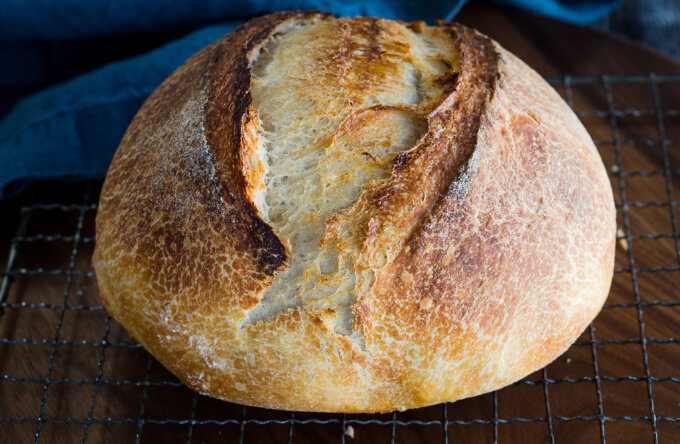
Overnight Sourdough Bread recipe is the perfect recipe to learn baking with a sourdough bread starter. Our step-by-step instructions and video will have you creating an amazing loaf of bread at home in no time.
This Sourdough Bread recipe couldn’t be easier to make and it’s a lot quicker compared to other sourdough bread recipes from starters.
This 500g homemade sourdough recipe has a tender crumb with a slightly sour flavor surrounded by a beautiful crisp crust that has that pull you want in artisan bread.
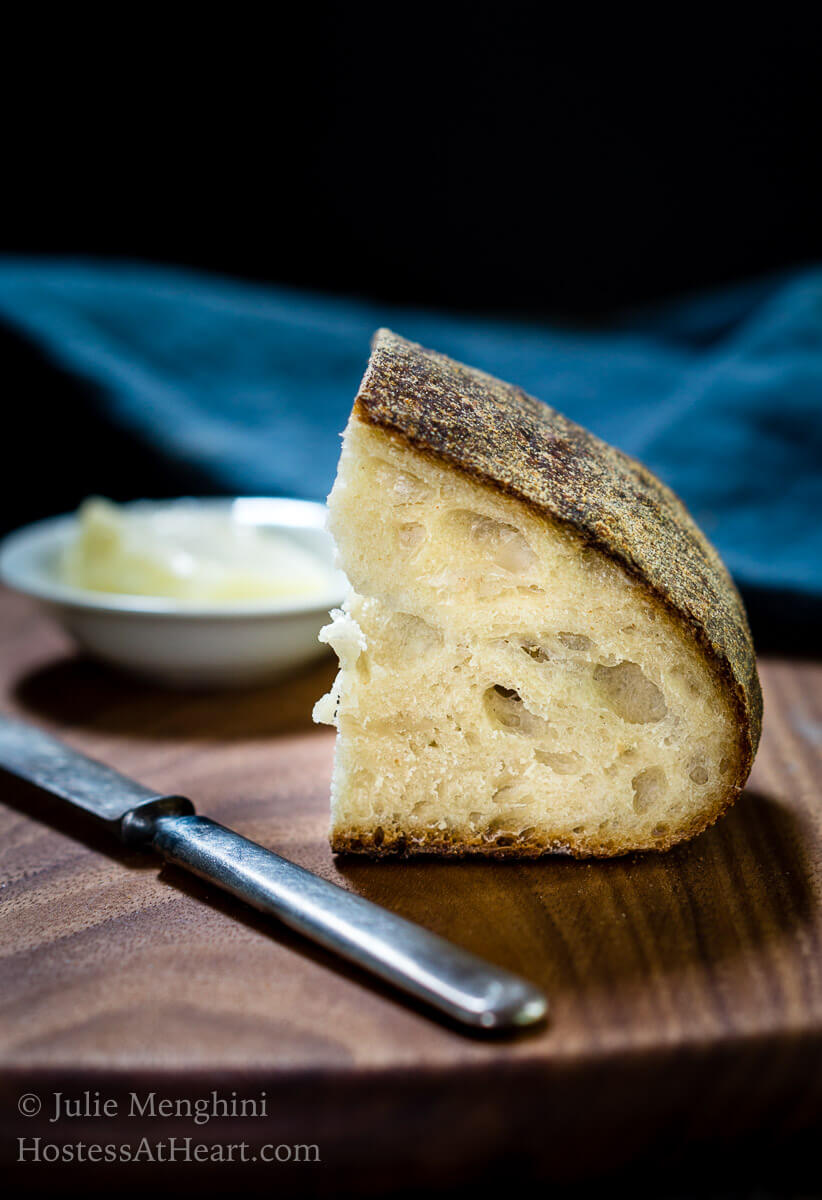
Hello, Julie. Just wanted to say thank you for sharing your overnight sourdough recipe as it really works well for me, a lot of people have shared their methods and this one is simply the best one I have come across so far. So thank you again!”
Kris T
What is Sourdough Bread
Sourdough bread is made by fermentation of dough using naturally occurring lactobacilli and yeast. Sourdough bread has a mildly sour taste not present in most bread made with baker’s yeast and keeps better than other bread due to the lactic acid produced by the lactobacilli. Wikipedia
What is different about sourdough bread?
The difference is in how they are made. Regular bread is made using store-bought yeast that reacts with gluten, making the dough rise. Sourdough bread is made with a “starter“. This starter is made from a combination of yeast and bacteria growing inside a paste made of flour and water.
Make your own starter!
Need help with your sourdough starter? Our Complete Sourdough Baking Guide covers everything from creating a starter from scratch to maintaining it long-term, plus advanced techniques and troubleshooting.
Health Benefits of Sourdough Bread
The fermentation that occurs from using a starter has been shown to lower blood sugar, be easier to digest and can even be tolerated by gluten-resistant individuals.
However, that’s not to say it is gluten-free. Sourdough bread contains higher levels of folate and antioxidants than other bread. Healthline is a very thorough reference regarding the health benefits of sourdough.
Ingredient Tips:
- Bubbly starter – I recommend feeding your starter and letting it sit out at room temperature 4 to 6 hours or until it increases in volume by about 30% and passes the float test.
- If your dough is runny it can be because your starter was actually starving when you used it.
- Bread Flour – Bread flour has a higher protein content than AP flour. That higher protein provides more structure to your loaf.
- If you substitute, they will both be delicious, and the texture will be the same but you may find the loaf made with AP flour balloons out more or doesn’t rise as high.
- Water – There’s a lot of controversy regarding water in bread making. Some experts say if you can drink it you can use it to bake with. Other experts say the chlorine can inhibit yeast activity.
- Mineral content (hardness) can reduce extensibility (elasticity and ability to stretch) of the dough.
- Salt – I use fine sea salt. It is easier to incorporate and dissolve than a coarser salt.
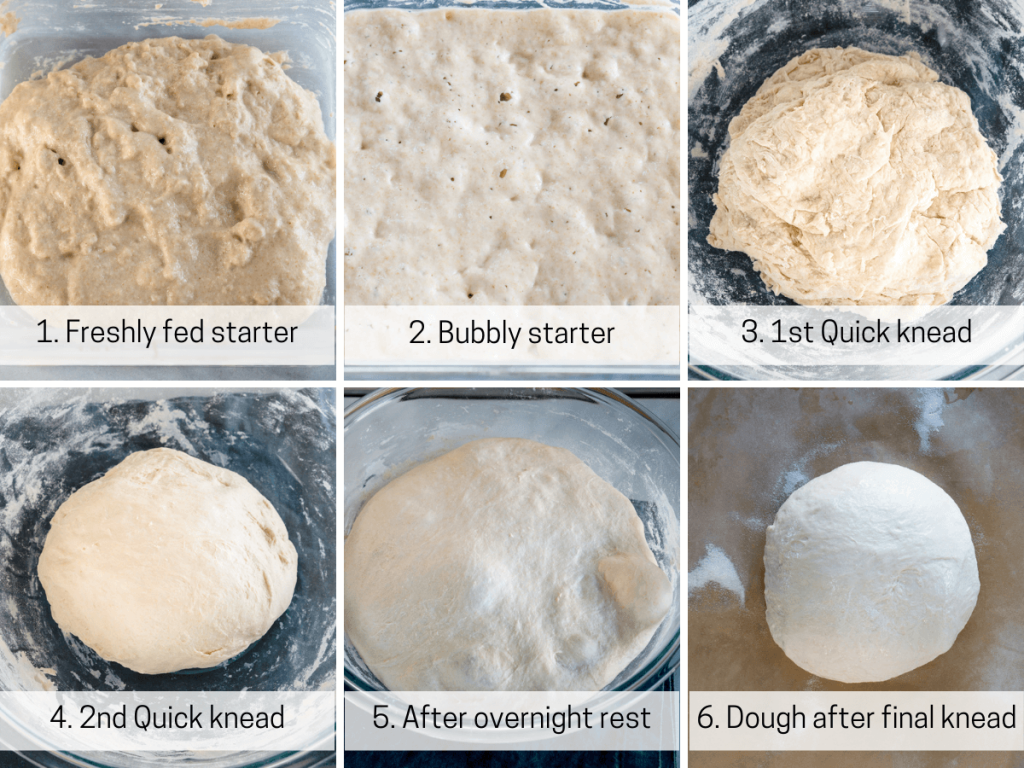
The above pictures from top left to bottom right.
- The freshly fed starter is thick.
- The Bubbly starter is ready. when bubbly and passes the float test.
- 1st quick knead just to combine ingredients (about 1 minute). The dough is thick and heavy.
- 2nd quick knead after a 30-minute rest. The dough is softer and smoother.
- Dough after 8 hours is full of air bubbles.
- Dough after final delicate knead is smooth and silky.
Absolutely! We love adding dried fruit such as apricots or cranberries, chopped nuts, cheese, olives, or herbs such as rosemary or thyme.
We recommend that you start by adding no more than 20%. So for this 500-gram loaf that would be
500 x 20% = 100 grams. You shouldn’t have to adjust your baking time.
Be careful that you don’t add a lot of moisture. Semi-hard cheeses such as cheddar shredded or diced into smaller pieces work well. Drain fresh fruit or olives of excess juice.
Sourdough Baking Guide is a comprehensive resource covering starters, fermentation, shaping, scoring, troubleshooting, and advanced baking methods.
Recipes using a bread starter
- Multi-Grain Wheat Bread Recipe
- Spelt Sourdough Bread
- Sourdough Sandwich Bread using Bread Starter
- Multi-Grain Wheat Bread
- 750gr All-Purpose Flour Sourdough.
Pro tips for Overnight Sourdough Bread
Resting times
Want to save this recipe?
I'd like to receive more tips and recipes from Hostess At Heart!
Don’t let bread rule your life! Here are some resting times that may help you to bake according to your schedule
- Counter rise – Written as is, this recipe has a counter rise of 3 to 8 hours. I’ve shaped it and let it rest in a banneton or you can carefully shape it just before baking it. The rise time is variable. If you have a warm kitchen, it may be ready sooner. Press your thumb into the dough, and if it bounces back slowly, it’s ready to bake. If it bounces back quickly, it needs a little more time to rise. If it stays dented, it’s probably over-proofed.
- Refrigerator proofing – If you don’t choose to bake your bread at the 3 to 8 hour counter proof, we recommend a 90 minute to 4 hour counter proof. Shape the dough and place it seam-side up into a banneton basket or a bowl lined with a kitchen towel that’s dusted with flour. We like dusting ours with a 50/50 mix of wheat flour and rice flour. We’ve actually left our bread in the refrigerator for up to 18 hours with no problems.
- When you’re ready to bake, remove the shaped dough from the refrigerator and let it sit on the counter while your oven preheats. Place it in the dutch oven, score it, and bake as usual.
If you do the full counter proof and then refrigerate the dough, it will be over-proofed. For that reason, try a much shorter counter rise and then refrigerate it.
More helpful tips
- Feed your starter earlier in the day. When it’s bubbly, do the test float. If it’s runny, it’s used up all its energy and needs to be fed again before you can use it. To see if your starter is ready, put a small amount in a bowl or cup of water. If it floats, it’s ready!
- Your bread can be cooked in a cold Dutch oven but I like the color and oven rise I get from preheating my lidded pot.
- To properly bake the bread we rely on an instant-read thermometer. The bread is finished baking when it reaches an internal temperature of 205ºF to 210ºF.
- This bread freezes beautifully. I wrap it in plastic wrap or a ziplock bag and then heavy-duty foil.
- Each time you bake, we keep a notebook and write down anything we do differently such as resting time, baking time, or adding additional ingredients. It’s so difficult to remember what worked the best unless we can look back and see what we were happy about or wanted to do differently the next time. This will also help you to determine what resting times work for you.
YOU MAY NEED
The following are affiliate links. Hostess At Heart is a participant in the Amazon Services LLC Associates Program, an affiliate advertising program designed to provide a means for us to earn fees by linking to Amazon.com and affiliated sites. You can read my full disclosure.
6 Quart Enameled Cast Iron Dutch Oven. – I love this Dutch oven. I have three that are triple the price of this one and it’s my favorite. It bakes my bread perfectly and makes a mean ragu recipe.
Zatoba 1003 Black Walnut Bread Lame Decorative Dough Slasher, 2x2x8 inches – I started out with a lesser quality lame and while this one isn’t expensive it’s definitely better quality and has made a prettier slash in my dough. You can also use a sharp knife.
Instant-read Thermometers aren’t just for meat! I use them to know when my bread is baked. I bake until I get an internal temperature of 205º F to 210º F or anywhere in between.
I have two books (out of several) that I’ve learned so much from. I recommend them exclusively to help in your bread experience. They are easy to read and will help you get that beautiful loaf on the table!
This is a 500gr loaf of bread which isn’t large. Baking bread is all about percentages. If you want a larger loaf, you can adjust the “Servings” in the recipe card and it will calculate your ingredients. (Thank you, Daniel, for this question!)
I hope you enjoyed this delicious recipe as much as we do. Drop me a comment below, and don’t forget to give it a star rating. ⭐⭐⭐⭐⭐. Your comments and ratings help others decide if this recipe is for them too.
Conversions are listed below the recipe card
Conversions for Overnight Sourdough Bread recipe
We realize that many of you aren’t comfortable using a scale. The closest conversions are the following.
- 4 cups flour
- 1 1/4 cup water
- 2/3 cup starter
- 1 1/2 tsp salt
A disclaimer is that I’ve never made this recipe without weighing the ingredients so I can’t guarantee or possibly troubleshoot any problems you may have with the recipe.
If you like this recipe you may enjoy these too
- Homemade Crusty Bread recipe
- 6 Ingredient Simple Classic Italian Bread Recipe
- Soft Buttermilk Sandwich Bread
- Simple Ciabatta Bread Recipe – Made 2 Ways!
- Spiced Apple Star Bread
This bread was made possible by the resources and recipes shared by Elaine, Selma, and Celia! Please visit all three of these blogs for amazing bread information!
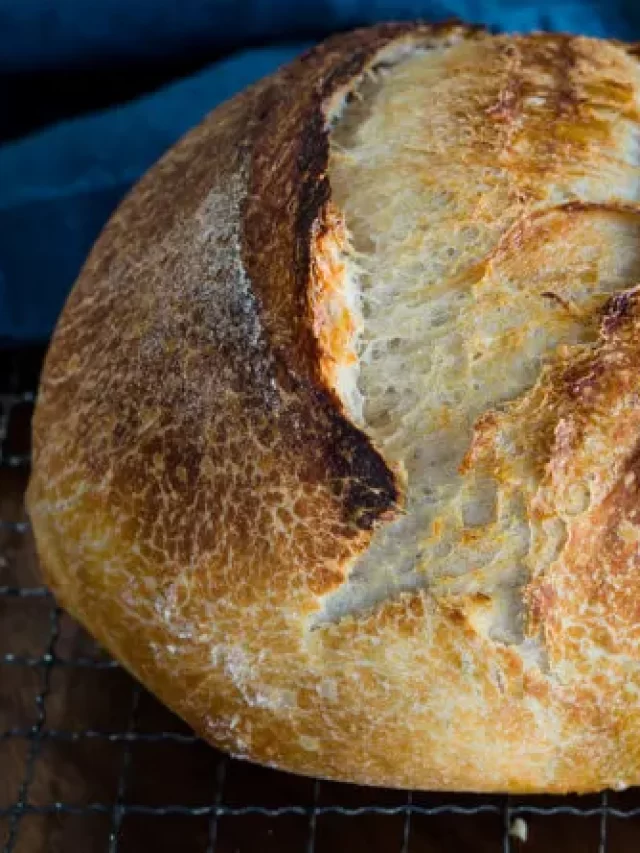
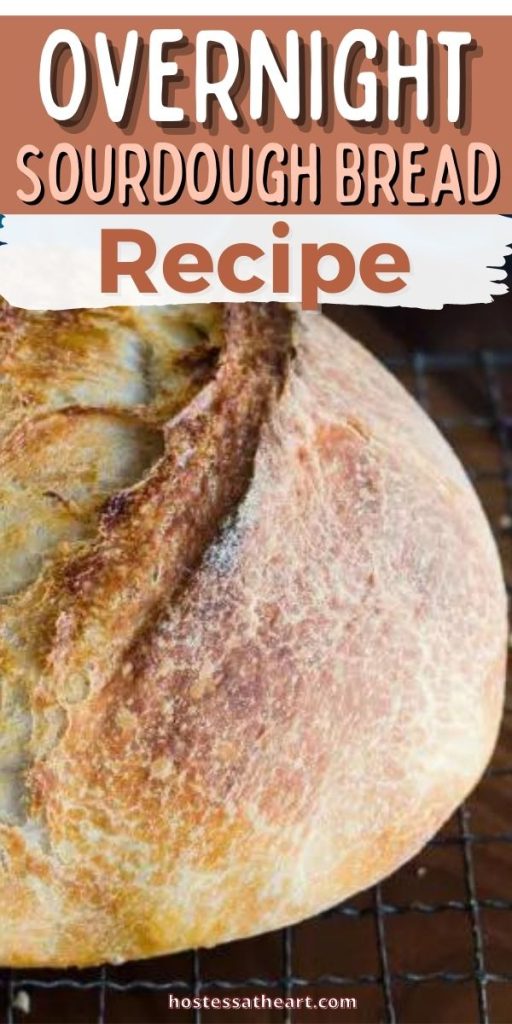
Did you enjoy this recipe? Don’t forget to pin it for later and follow me on Pinterest for more delicious recipes like this one!

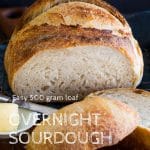
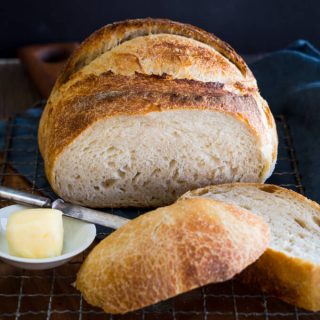






Hi Julie,
After the major bulkrise, I made the mistake of handling the dough with my bare hands instead of using a scraper. The dough stuck to my hands and as i recoiled, I pulled the dough apart instantly losing all gluten structure and gas bubbles. Not my finest moment as my 3yo son watched me lose my temper. Nonetheless, the oven was already warmed so I baked the dough mass anyway . While there was no oven spring, the result is still soft inside and edible. I will try this recipe again as soon as possible. Not willing to give up yet Thanks for sharing your recipe.
Regards,
Kevin
Well, Kevin, while we can rejoice when we get that beautiful loaf, there are those times where you’d rather paper the walls with the dough. I just tried a recipe 3 times with mediocre result, tons of flour and worst of all time. Just know that us bread bakers have to have a sturdier disposition than that dough sometimes, and even though you see the beautiful successes, there are probably that many less than perfect attempts. Hang in there and let me know if I can help. My kids grew up hearing my less than patient moments and turned out anyway LOL! Happy Thanksgiving, my friend and thank you for stopping by.
Hi Julie, I had an improved loaf after strengthening my starter beforehand with some extra feeds of wholewheat flour. Kevin
Thanks, Kevin! I’ve also had great luck with a tablespoon of rye.
This is a great recipe so easy to bake
Sourdough bread. It’s s perfect dough
Not to wet easy to use
Thank you so Much, Hinda! I appreciate you’re sweet comment!
Hello from New Zealand. Great recipe. Your instructions are excellent and I found the dough really easy to handle (well, as easy as dough ever is to handle!). It was very forgiving of the fact I had to sub in some plain flour as I ran out of bread flour.
Hello Laura from New Zealand! Thank you for visiting! I’m so glad that this recipe worked for you. Sometimes it’s difficult to explain to people that bread is about the feel and not only the ingredients. Sounds like you get it! You can definitely experiment with different flours as I will be doing more of with this recipe. Thanks again and have the best day ever! ~ Julie
I followed this to a T, but when I woke up, the dough was completely liquified. I had to add a lot of flour before putting in the oven. I’m not sure what I did wrong, but it was more like melted ice cream than dough.
Wow, Maggie, I haven’t ever had that kind of result. I am working with another reader that is though so when we figure out what works for her, I’ll let you know.
This is the perfect SD bread recipe ! I don’t know why I would use anything else ! I have made bread and rolls with it with great success ! Thank you!
Having the right size pan and being able to cover at first is so important for the bread version. I used an idea from another recipe for my rolls. I put a cookie sheet in the bottom of the oven when I pre heat and then when I put the rolls in in the muffin tin, I put a cup of water in the cookie sheet. Voila! Steam !
Thank you, Steph for your amazing review! I’ve got to admit that I haven’t used it to make rolls yet but will definitely be doing so! Your contribution is inspirational and definitely helps our community!
I love this recipe. I’ve tried it with both whole wheat flour and a good stone ground unbleached white bread flour. Both have turned out great! I love a really sour flavor to my dough. I’ve found that after the second knead I let it rise in the fridge for 24 hours. I then do another quick knead in the bowl and rise again in the fridge over night. I then let it come to temp the next morning while the oven is heating and follow the rest of the instructions as written. The bread turns out amazing and has such depth of flavor. I started “Sparky” about 4 months ago and I am very happy with my results! Sparky is a whole wheat starter and I named it thus because it is what gives the bread it’s spark of life! I’ve been baking and cooking for years but earlier this year I decided I wanted to tackle sourdough for the first time. My results just keep getting better!
Katie, we are bread soul sisters! I love your passion that I totally share. I can’t wait to try your method! Sparky sounds like a great worker and I love the name! Thank you for sharing your experience with this recipe and I hope you’ll stop back again soon!
I am new to baking bread I have made 3 loafs and they’re good but seem to be a bit heavy any reason for this?
Many thanks.
Does the crumb have a light spring or is it really dense? Are you baking them out until they are golden? I actually use an instant-read thermometer to test mine and make sure it’s around 207F. Also, are you using a dutch oven? They shouldn’t be heavy Alan. Maybe if you send me a photo that might help because there is so many variables. If you email my hostessatheart at gmail.com you can attach them. Let’s get this figured out, and I’d love to help!
Thanks for getting back- the crumb has a light spring i am baking until golden, not using a dutch oven i have attached what am cooking the bread in ‘ Pyrex bowl’ i have just baked another loaf of bread and this seems to be a lot lighter and i actually kept in the fridge overnight stretch and folded put back in the fridge overnight again and carried on doing what you advise and its seems to be a lot lighter the dough was also alot easier to fold and stretch too.Many Thanks Alan Edwards
Glad to hear that it’s working better. Sometimes it’s just trial and error. The temperature and moisture of the air can even make a difference. Just give me a shout if you have any questions. Thanks, Alan!
Sometimes a dense loaf has too little water to flour ratio. Try adding a little extra water next time.
Thank you, Katie. It’s sometimes hard to know how to fix bread issues since flours and measuring are so individual. I’m hopeful your comment will help others with these issues.
How do you get the crust to get that nice color? Mine seems to be more golden?
Hi Lidia! Did you remove the lid the last 20 minutes? You can use an instant-read thermometer and if your bread reads 195-210 remove it but if it’s not up to temp give it a little more time. It could be your oven or the dutch oven as well. Do you have any difficulty getting other baked goods to brown?
Trying this tonight! So many recipes take sooo long. I’ve had my starter, Doug (my daughter named it by dropping the “h” from dough) , for over a year and he is very forgiving just like yours.
I love “Doug” That’s awesome! I hope you’ll let me know how it goes and if you have any questions!
Best sourdough recipe I’ve tried. Video really helped me when I first started baking sourdough. Good rise when I put dough into a hot pan, hot oven. Thanks so much for specific instructions!
Thank you Phyllis! I’m so happy that you let me know it worked for you.
I want to make this. I have whole wheat sourdough starter at the ready, but I’m actually wondering if I can make this in long loaves on a baking sheet. It’s just easier for me than a heavy dutch oven.
You sure can Jennifer! It may have a little it different crust because the dutch oven acts as a steamer. Do you have an aluminum roaster? They are lighter and may work as well.
I am trying this as we speak! Made my dough last night, about to go down and finish up the process. I’ve usually gotten flat sourdough boules, no matter how much I knead my dough, or what flour I’ve used, so I am excited to try this and see if it gives me a better looking bread. Either way, it always tastes great! P.S., I’ve named mine Mama Blue. We just moved to Kentucky (The bluegrass state!) and this is a fresh starter. I thought the name was fitting!
I love Mama Blue! I hope you’ll come back and let me know how it goes for you and maybe change your rating to 5 stars!
Finally, a recipe that isn’t too complicated and works! My nephew, a professional chef, gave me some starter and I have had very marginal success. My loaf was perfect this time! My starter was thinner than yours and I was skeptical it would rise, but i had a great result! I did the 8 hour and then refrigerated it. Made the loaf this morning!
Thank you!
Thank you so much, Suzette, for your amazing comment! I know exactly what it feels like to pull that amazing loaf from the oven and it comes out beautifully! I feed my starter with 100 grams of filtered water, 50 grams of unbleached all-purpose flour and 50 grams of whole wheat flour. Try that for a few days out on the counter to see if you can strengthen it. Once it starts getting stronger feed it and put it in the fridge until you’re ready to use it again. Let me know if that helps! Julie
This is the best recipe using sourdough starter ever!! This is one of my go to recipes for bread. So easy and I feel like I’m eating healthy. I use half Organic bread flour and half einkorn freshly milled flour. And it comes out great and very tasty. Thank you so much for sharing this recipe!!
Ps…I overuse !’s too! 😉
Hi Karen! Thank you for such a sweet comment! I haven’t used Einkorn flour yet and freshly milled what a wonderful ingredient! I think homemade is definitely a step closer to healthy eating too!!!
I want to try your recipe. I have a question on how to make the bubbly starter?
Hi Cristie! I’m sending you an email.
Karen, do you change anything other than using 50% Einkorn flour? I’ve made the recipe with 25% Einkorn flour, the dough is soft and there’s not a lot of oven spring.
I haven’t baked with Einkorn flour yet but here is a good reference for additional information substituting flour: https://blog.kingarthurflour.com/2016/07/21/substitute-bread-flour-all-purpose-flour/
How do I get a starter? This bread looks amazing and I can’t wait to try it but am not sure how to get starter going?
Hi Corryn! You can make your own or actually Buy Starter. If you can’t get it locally, you can send away for it. I trust King Arthur https://www.kingarthurflour.com/shop/items/classic-fresh-sourdough-starter-1-oz. Make sure you read up on feeding it and keeping it alive. It’s a bit scary at first but it doesn’t need to be.
Hi, I love this recipe. Has turned out great everytime and a lot less steps than other ones I looked at. I was wondering, how I would adapt the directions to use a stand up mixer/dough hook? Thx!
Thank you Rachel!
Did you notice my question? Can I do it with the dough hook? Or has to be done by hand?
Sorry that I missed replying to that question, Rachel! You can use a dough hook. However, doing it hand will help you know what the texture is. You can just pinch it between your fingers to feel it occasionally as you use your mixer.
Unfortunately this is the only time I have not had success with my bread from starter. I usually follow a more traditional method of kneading. My bread is almost a pancake….it looked similar up until it came out of the oven.
There was no rise while baking. In fact it flattened out even more. Not sure what went wrong but I probably will not try this again
I’m sorry to hear that this didn’t work for you, Traci. I don’t know where to start because it could be so many things. I’ve had similar problems with recipes and it’s frustrating when it works for so many but not for me after all of the work and ingredients. I’d be glad to try and problem solve this recipe if you’d like to give me information regarding your starter and the flour you used? Feel free to email me at hostssatheart@gmail.com.
Quick Question!! I’m so excited to try this recipe. Can I use all purpose flour or do I need to use Bread flour. Secondly do I bake it with the lid on or off the Dutch oven?
You can use All purpose flour Sara. It may not rise quite as much and may be a bit denser but it will work. Here is an article if you’d like to read up on it. Yes bake with the lid on for the first 20 minutes and then remove the lid for the final time shown in the recipe card. Send me a pic! I can’t wait to see how it goes for you.
Hi! I have made this many times and it’s always turned out. I got brave and tried adding a cup of rye flour to it and it is currently in the oven. It didn’t rise as well and the dough seemed harder..do you have any recommendations on how to add ( if possible) other flours to this recipe?
This is a good reference Jen: https://blog.kingarthurflour.com/2016/07/21/substitute-bread-flour-all-purpose-flour/
Hi,
Can the dough be left more than 8 hours?
It can! If you aren’t going to be baking it right away, refrigerate it after 8 hours. Take it out of the refrigerator while the oven warms up. I recommend letting the oven preheat for 45 minutes. Please let me know if you have any questions. Thank you for stopping by!
Can you please give me measurements in ounces and cups please? I find these measurements very confusing
Hi Marlene! I totally get the confusion and I was in a similar situation when I first starting to bake by weight.
Some measurements don’t convert exactly and there are several converters online that help. Here goes: 150 grams starter total 2/3 cup, 285 grams water is roughly 1-1/4 cups, 500gr bread flour is about 4 cups, and 9 grams salt equals 1-3/4 teaspoons.
Disclaimer is that I’ve never made this recipe without weighing the ingredients.
This looks wonderful! I’m new to sourdough bread baking as well. So far I’ve had two successful loaves and two total failures. I have a lot to learn. My question concerns the time between feeding my starter and mixing my dough. Should I feed it and then immediately mix up the dough or feed and then wait minutes… hours… overnight? I’m really confused about that point. A lot of recipes call for “fed” starter but I can’t find out what that really means. Is “fed” right after mixing in the flour and water or hours later?
This is a great question Rhonda that I need to clarify. I made a loaf of this a couple of days ago and what I did was feed my starter earlier in the day and then mixed it up that evening. The next morning I had beautifully risen dough. You want the starter to have a chance to get nice and bubbly. If it’s runny it’s used up all of it’s food and needs fed again before using it. Does this help?
Yes, it does help. Thank you for answering …and so quickly! I’ve done just what you said you did. I fed my starter this morning and just finished my second knead about an hour ago (9 p.m.). I’ll finish it up and bake in the morning. Fingers crossed!!
Woo hoo…and the answer is? How did it come out Rhonda?
So I’ve made this twice now, and the result tastes absolutely wonderful, but I’m getting very little oven spring. I wonder why?
Kim, do you preheat the dutch oven in the oven as it preheats? I know a lot of people say you don’t have to which you don’t but that is one of the biggest differences I see is lack of spring. Is your dough rising well after the overnight? This isn’t a huge loaf but you should be getting some bulk from it. Is your starter nice and bubbly when you mix it? (water test) Lastly, I preheat my oven at least 25 degrees hotter than the baking temperature and then as soon as my bread goes in I turn it down. That keeps t oven from dropping below the temperature I want my bread to bake at. Have you checked the temperature of your oven? If not get a cheap thermometer and put it in the bottom of your oven after it preheats. If it’s low you’ll want to raise your baking temperature by that amount. Let me know if any of these reasons could be the culprit. If not, we’ll keep narrowing down your issue.
Finally a sourdough bread recipe that came out right! Thank you so much for this recipe and for the easy instructions and the video which was a big bonus and helped a lot too. I made one loaf and after it cooled tried a slice, then immediately made 3 more loafs. It was so good I just had a slice toasted for breakfast this is an amazing recipe. Thank you!
Oh, Heather, you’ve made my day! I love that your bread came out successfully! It’s one of John’s favorites for flavor and one of the easiest to make. A win win! If you would ever like to see anything featured, please let me know. I get my inspiration from you!
Hi Julie,
I’ve made your recipe twice now and it’s perfection. Thank you for the video too, just makes it all clear!
One question… under the pro tips it says to leave on counter for 8 hours then into the frig overnight. But your instructions say to leave out overnight on the counter, which I have done with great results.
Just wondering if it might be confusing to some. I know I am new to sourdough bread baking and try to follow instructions to the letter. Perhaps both methods work?
Hi Shirley! Glad it’s all working for you and appreciate you letting me know that I need to clarify my instructions. What I meant is if you make this bread later in the day you can just leave it out overnight (or approximately 8 hours). What I’ve also done is made it earlier in the day and let it set out on the counter to rise for 8 hours. And then if I’m not baking it I’ll put it in the refrigerator to slow the fermentation time and bake the next day. Does that help? Let me know so I can make it clear. Thank you my sourdough friend!
Hi Julie,
Thank you for the clarification. It’s great that sourdough is flexible and that both ways work.
You’re welcome, Shirley! Getting started is a bit intimidating but with a bit of experience, we know that it’s not as scary as we make it out to be. Have a great day my bread baking buddy!
Making this turns me into a professional baker! Such a great bread and the crust on this!! WOW!
Thank you, Jennifer!
Making overnight sourdough bread is now my top task for this weekend. You are making it look so easy, so, I am sure I can make it. Your bread looks perfect!
Thank you Rini! It’s definitely a labor of love for me!
There is NOTHING as delicious as homemade sourdough bread!!! Absolutely LOVE this recipe!
Thank you, Brandi!